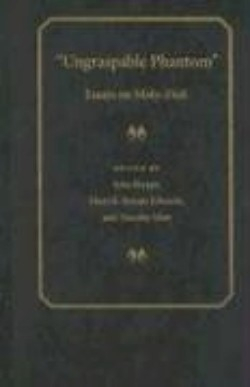
Ungraspable Phantom
Essays on Moby-Dick
“Modern American literature begins … with Moby-Dick,” asserts novelist E. L Doctorow in the lead essay of this book. Certainly, no book has a better claim to the title “Great American Novel” than Herman Melville’s masterpiece. Nor should that claim be mitigated by the fact that while so much of the American reading public has heard of Moby-Dick, a somewhat fewer number have actually read the novel in its entirety. Moby-Dick is fashioned out of an alternating rhythm of narrative and digressive chapters, advancing and retarding the famous pursuit of the white whale, and this give and take mimics the way Melville’s literary “stock” has cycled from low to high to low to high again, now a full century and more after his death.
The essays collected in this volume were initially proceedings of an academic conference held in 2001 on the occasion of the 150th anniversary of the publication of Melville’s classic. The conference went ahead as planned in October of that fateful year, but the shadow of 9/11 hangs heavily over this collection “loomings,” Melville might say). The relationship between the novel and the events of 9/11 and, importantly, its aftermath) is addressed in many of these essays, with the editors suggesting in this vein: “Moby-Dick is not so much about a terrorizing whale as it is about our reactions to terror.”
In a collection this massive the essays will inevitably be uneven in quality, but it must be said that this is a fine body of work: wide-ranging, thoughtful, engaging, and full of interesting perspectives. With the exception of Doctorow, all the contributors are academic scholars, but the general reader with an interest in Melville will find much to cherish here. Among the many topics addressed in the collected essays: the construction of the novel, including treatments of the “break out” chapters; the book’s relationship to the Bible and Shakespeare; Melville’s formative relationship with Hawthorne; connections to Melville’s other work; Melville and “the depressive mind”; Lacanian psychoanalysis, Melville, and identity; *”*Death, Memory, and the Law”; “morality”; “reading”; “Mapping” and the Enlightenment; race and racial history in the United States, the “Doubloon and Latin American” as well as Native American culture; problems of translation and the status of the novel in German and Brazilian culture; and the novel’s “stage and web renderings.”
The editors, scholars of American literature at Hofstra, the University of Connecticut, and the University of North Carolina-Chapel Hill respectively, have cast a wide net for their elusive quarry, the tantalizing solution to the enigma of this massive novel. That solution remains “ungraspable,” which is probably just as well for subsequent generations of enterprising readers.
Disclosure: This article is not an endorsement, but a review. The publisher of this book provided free copies of the book to have their book reviewed by a professional reviewer. No fee was paid by the publisher for this review. Foreword Reviews only recommends books that we love. Foreword Magazine, Inc. is disclosing this in accordance with the Federal Trade Commission’s 16 CFR, Part 255.
